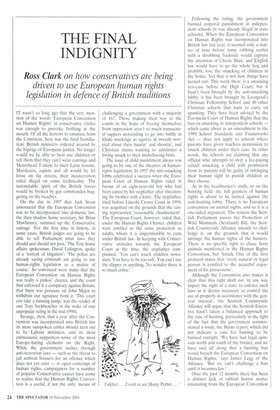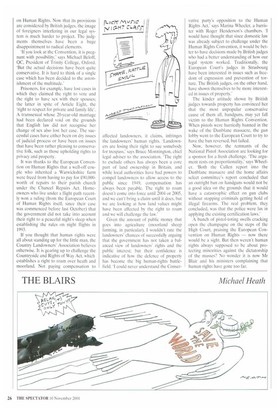THE FINAL INDIGNITY
Ross Clark on how conservatives are being
driven to use European human rights legislation in defence of British traditions
IT wasn't so long ago that the very mention of the words 'European Convention on Human Rights in conservative circles was enough to provoke frothing at the mouth. Of all the horrors to emanate from the Continent, here was the final humiliation: British ministers ordered around by the bigwigs of European justice. No longer would we be able to beat our children or tell them that they can't wear earrings and Motorhead T-shirts to their Latin lessons. Murderers, rapists and all would be let loose on the streets, their incarceration ruled illegal on some technicality. The indomitable spirit of the British forces would be broken by gay commandos buggering on the beaches.
On the day in 1997 that Jack Straw announced that the European Convention was to be incorporated into domestic law, the then shadow home secretary, Sir Brian Mawhinney, summed up the Conservative outrage. Tor the first time in history, in some cases, British judges are going to be able to tell Parliament what laws they should and should not pass.' The Tory home affairs spokesman, David Lidington, spoke of a 'torrent of litigation': 'The police are already saying criminals are going to use human-rights legislation as a matter of course.' So convinced were many that the European Convention on Human Rights was really a pinkos' charter, and the court that enforced it a conspiracy against Britain, that there was pressure on John Major to withdraw our signature from it. 'This court can take a running jump,' was the verdict of one Tory backbencher in the wake of one unpopular ruling in the mid-1990s.
Strange, then, that a year after the Convention was incorporated into British law its most outspoken critics should turn out to be Labour ministers, and its most enthusiastic supporters some of the most Europe-hating elements on the Right. While the government rushes through anti-terrorism laws — such as the threat to jail anthrax hoaxers for an offence which does not yet exist — in open contempt of human rights, campaigners for a number of popular Conservative causes have come to realise that the Human Rights Convention is a useful, if not the only, means of challenging a government with a majority of 167. Those making their way to the courts in the hope of freeing themselves from oppression aren't so much transsexual sappers demanding to go into battle in khaki stockings as squires in tweeds worried about their huntin' and shootin', and Christian mums wanting to adminster a loving smack to their misbehaving brats.
The issue of child punishment always was going to be one of the theatres of humanrights legislation. In 1997 the anti-smacking lobby celebrated a success when the European Court of Human Rights ruled in favour of an eight-year-old boy who had been caned by his stepfather after threatening his brother with a knife. The stepfather, tried before Lincoln Crown Court in 1994, was acquitted on the grounds that the caning represented 'reasonable chastisement'. The European Court, however, ruled that, under the Human Rights Charter, children were entitled to the same protection as adults, whom it is impermissible to cane under British law. In keeping with Conservative attitudes towards the European Court at the time, the stepfather complained, 'You can't touch children nowadays. You have to be too soft. You can't use the slipper or anything. No wonder there is so much crime.' Following the ruling, the government banned corporal punishment in independent schools (it was already illegal in state schools). When the European Convention on Human Rights was incorporated into British law last year, it seemed only a matter of time before some sobbing urchin with a throbbing backside would capture the attention of Cherie Blair, and English law would have to go the whole hog and prohibit, too, the smacking of children in the home. Yet that is not how things have turned out, This week there is a smacking test-case before the High Court, but it hasn't been brought by the anti-smacking lobby; it has been brought by Liverpool's Christian Fellowship School and 40 other Christian schools that want to carry on spanking. They have been advised by the European Court of Human Rights that the ban on smacking in independent schools which came about as an amendment to the 1999 School Standards and Frameworks Act — does not apply to schools where parents have given teachers permission to smack children under their care. In other words, the schools are claiming that any official who attempts to stop a fee-paying school smacking a child with permission from its parents will be guilty of infringing their human right to punish children as they choose.
As in the headmaster's study, so on the hunting field: the full gunnery of human rights is about to be turned against the anti-hunting lobby. There is no European convention on animal rights, and so it is a one-sided argument. The minute the Scottish Parliament passes the Protection of Wild Mammals (Scotland) Bill, the Scottish Countryside Alliance intends to challenge it, on the grounds that it would infringe the human rights of the hunters, There is no specific right to chase furry animals mentioned in the Human Rights Convention, but Article One of the first protocol states that 'every natural or legal person is entitled to the peaceful enjoyment of his possessions'.
Although the Convention also makes it clear that this right shall not 'in any way impair the right of a state to enforce such laws as it deems necessary to control the use of property in accordance with the general interest', the Scottish Countryside Alliance will argue that the Scottish Executive hasn't taken a balanced approach to the case of hunting, particularly in the light of the fact that the government commissioned a study, the Burns report, which did not indicate a case for hunting to be banned outright. 'We have had legal opinions north and south of the border, and we have said all along that a hunting ban would breach the European Convention on Human Rights,' says James Legg of the Alliance. 'But we can't challenge a ban until it becomes law.'
Over the past 12 months there has been a distinct lack of tabloid horror stories emanating from the European Convention on Human Rights. Now that its provisions are considered by British judges, the image of foreigners interfering in our legal system is much harder to project. The judgments themselves have been a huge disappointment to radical elements.
If you look at the Convention, it is pregnant with possibility, says Michael Be!off QC, President of Trinity College, Oxford. But the actual decisions have been quite conservative. It is hard to think of a single case which has been decided to the astonishment of the multitude.'
Prisoners, for example, have lost cases in which they claimed the right to vote and the right to have sex with their spouses; the latter in spite of Article Eight, the 'right to respect for private and family life'. A transsexual whose 20-year-old marriage had been declared void on the grounds that English law did not recognise her change of sex also lost her case. The successful cases have either been on dry issues of judicial process or have been on issues that have been rather pleasing to conservative folk, such as those upholding rights to privacy and property.
It was thanks to the European Convention on Human Rights that a well-off couple who inherited a Warwickshire farm were freed from having to pay for £90,000worth of repairs to their parish church under the Chancel Repairs Act. Homeowners who live under a flight path recently won a ruling (from the European Court of Human Rights itself, since their case was commenced before last October) that the government did not take into account their right to a peaceful night's sleep when establishing the rules on night flights in 1993.
If you thought that human rights were all about standing up for the little man, the Country Landowners' Association believes otherwise. It is gearing up to challenge the Countryside and Rights of Way Act, which establishes a right to roam over heath and moorland. Not paying compensation to affected landowners, it claims, infringes the landowners' human rights. 'Landowners are losing their right to sue somebody for trespass,' says Bruce Monnington, chief legal adviser to the association. 'The right to exclude others has always been a core part of land ownership in Britain, and while local authorities have had powers to compel landowners to allow access to the public since 1949, compensation has always been payable. The right to roam doesn't come into force until 2004 or 2005, and we can't bring a claim until it does, but we are looking at how land values might have been affected by the right to roam and we will challenge the law.'
Given the amount of public money that goes into agriculture (moorland sheep farming, in particular), I wouldn't rate the landowners' chances of successfully arguing that the government has not taken a balanced view of landowners' rights and the public interest; but their confidence is indicative of how the defence of property has become the big human-rights battlefield. 'I could never understand the Conser
vative party's opposition to the Human Rights Act,' says Marina Wheeler, a barrister with Roger Henderson's chambers. 'I would have thought that since domestic law was already subject to challenge under the Human Rights Convention, it would be better to have decisions made by British judges who had a better understanding of how our legal system worked. Traditionally, the European Court's judges in Strasbourg have been interested in issues such as freedom of expression and prevention of torture. The British judges, on the other hand, have shown themselves to be more interested in issues of property.'
The kinder attitude shown by British judges towards property has convinced her that the most unpopular conservative cause of them all, handguns, may yet fall victim to the Human Rights Convention. When pistols were hurriedly banned in the wake of the Dunblane massacre, the gun lobby went to the European Court to try to have the ban reversed, hut failed.
Now, however, the remnants of the National Pistol Association are looking for a sponsor for a fresh challenge. The argument rests on proportionality,' says Wheeler. 'Both the Cullen report into the Dunblane massacre and the home affairs select committee's report concluded that an outright ban on handguns would not be a good idea on the grounds that it would have a catastrophic effect on gun clubs without stopping criminals getting hold of illegal firearms. The real problem, they concluded, was that the police were lax in applying the existing certification laws.'
A bunch of pistol-toting swells cracking open the champagne on the steps of the High Court, praising the European Convention on Human Rights — now there would be a sight. But then weren't human rights always supposed to be about protecting minorities against the dictatorship of the masses? No wonder it is now Mr Blair and his ministers complaining that human rights have gone too far.















































































































 Previous page
Previous page